GENKIプログラム新規参加校の紹介
【2021年2月の活動報告】
1. Activity report for February 2021
In the GENKI program, we resumed the distribution of Euglena cookies during the period when Corona was closed * 1. In February, we distributed 203,000 cookies to approximately 7,300 people at 47 of the 75 schools covered by the GENKI program.
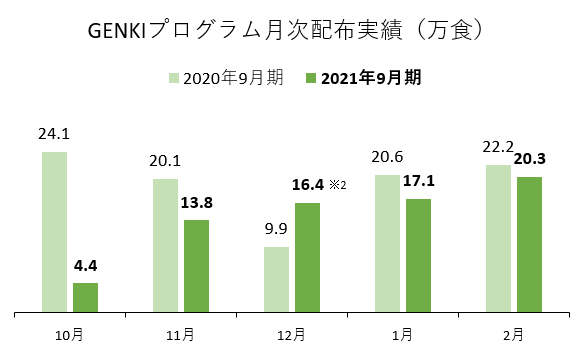
※1休校中でも先生方にはクッキー配布の為、学校に来ていただき、プログラムを再開する仕組みを確立しています。コロナ禍におけるGENKIプログラムの活動状況については、2020年8月、2020年10月の活動報告をご参照ください。
※2 例年12月は月の半分以上が冬休みで配布日数が少なくなりますが、2020年度は15日分を1度にまとめて計2回(合計30日分)配布しました。そのため、コロナ禍前の2020年9月期より配布数が多くなっています。
2. Introduction of new participating schools
Two new schools have joined the GENKI program since February. Euglena cookies are distributed to these two schools by having CZM (Center for Zakat Management), a local NGO that mainly supports people in need, agree with the activities and goals of the GENKI program and pay a part of the activity costs. doing. CZM bears a part of the GENKI program activity fee of 8 schools in total including these 2 schools, and they are very interested in this program.
The characteristic of the schools covered by the GENKI program that CZM is involved in is that they are all Madrasa schools. Madrasa is a religion-focused boys' school that studies the Quran of the Islamic scriptures in Arabic every day, in addition to the Bangladeshi curriculum. Most children live in dormitories next to the school. In Bangladesh, the school has been closed since March last year due to a pandemic caused by a new coronavirus infection, but at Madrasa, the government has allowed some schools to open. Against this background, two new schools have joined the GENKI program.
At Dallas Sana Elementary School, one of the two schools, children are living inconveniently because they are studying on a roofless relocation site for school repairs. As for eating habits, I eat curry and bread called ruti in the morning, and curry and a large amount of rice in the day and night. Side dishes are not nutritionally balanced with potatoes and sliced cucumbers. The school provides children with readily available milk and boiled eggs twice a week, but nutrition is still lacking. Therefore, the school Euglena cookies every day so that they can grow up healthy and build a strong body during the growing season.
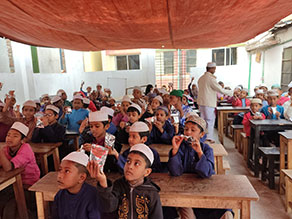
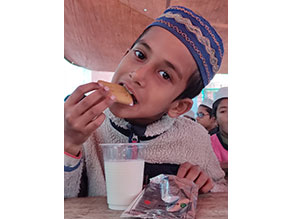
3. Science fair at school (science festival)
In Bangladesh, children choose science or liberal arts courses when they are in the 9th grade (3rd grade in Japan). According to the 2012 survey results, less than 20% of children choose science. * 3 There are two main reasons why there are few children who choose science in this way. First, the number of faculties in high school and university is smaller than that in liberal arts, so the learning environment is limited. Second, it is difficult to acquire specialized knowledge due to the small number of teachers specializing in science, especially science. Therefore, a math teacher may teach both subjects.
In addition, according to the National Achievement Survey conducted in 2015, only 10% of the students who "achieved the required academic ability" in the fifth grade, which is the current year of completion of primary education, had only 10% of the students, and the quality of education in primary science and mathematics. Issues have been shown again * 4. That's why the government launched a new curriculum in 2017. We provide training to teachers and start classes and events for children with an interest in math and science at school.
Under these circumstances, OBAT Elementary School, one of the schools targeted by the GENKI program, held a science fair for the first time this year in order to make children interested in science. Participants were limited due to the corona disaster, and 27 children participated. On the day of the event, the children presented the mechanism of the earthquake, the mechanism of hydroelectric power generation, the mechanism of water purification, the explanation of the solar system, etc. to the teachers and the staff of the GENKI program using pictures of the experimental results they made. The guests listened seriously to the children's explanations and asked questions and advice. It seems that the children were able to have curiosity about knowledge and science that could not be learned in class alone. The teachers say that they would like to increase the number of children who are interested in the field of science by continuing the science fair.
* 3 The Daily Star (2017) Science is out – The number of students pursuing science is decreasing at an alarming rate
* 4 JICA (nd) project outline
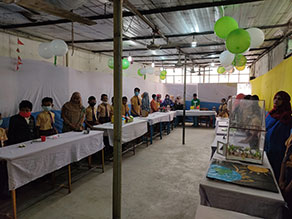
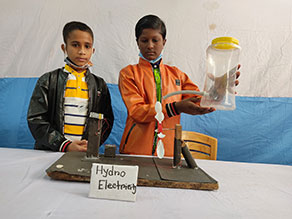
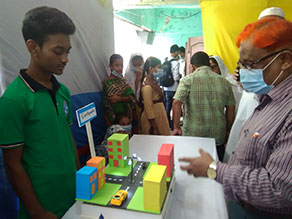
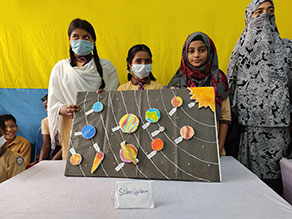
4. Japanese dietary information in the capital city of Dhaka
According to a survey conducted in October 2019, 1,080 Japanese people are resident in Bangladesh * 5. The number of Japanese companies operating in Dhaka has risen to about 300 * 6, and there are areas where embassies and Japanese companies gather in the capital city of Dhaka. Euglena has set up a Bangladesh office for seven years, there are more and more places where you can eat Japanese food in Dhaka.
* 3 Ministry of Foreign Affairs (2020) Statistics on the number of Japanese residents abroad
※Four JETRO (2019) Economic Overview of Bangladesh and Trends of Japanese Companies
There is an impression that Japanese food is high-class overseas, but recently there are places where Japanese food can be eaten cheaply. For example, "Yuzu", which opened in October 2020, is a restaurant that serves Japanese food at the food court of a shopping mall in the residential area of the Defense Attaché in the Milpur area.
At some famous Japanese restaurants in Dhaka, the lunch set costs more than 1,500 yen, but at "Yuzu", for example, shrimp katsudon (about 370 yen), one dumpling dish (about 100 yen), and 5 oversized shrimp tempura. You can easily enjoy Japanese food such as (about 485 yen) and California rolls (about 500 yen). In addition, there is "Chocolate dumplings" in the menu called Bangladesh. I actually tried it, but it was more like dessert than ordinary dumplings. Locally, there are many customers who want to enjoy many types, such as ordering about 10 items for one family.
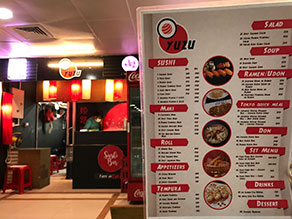

Vegetables and shrimp used in the menu can be procured locally, but many ingredients are not easily available. Noodles such as udon and ramen, dumpling skin, soy sauce, etc. are procured at the Asian market, and grilled seaweed, crab sticks, wakame seaweed, etc. are procured directly from Japan.
The frequency of eating out by GENKI program staff is about twice a month, which is not much higher than that of Japanese people. The cost of eating out is about 350 yen per person, so if you can easily eat Japanese food like "Yuzu", Japanese food may become more popular locally. I hope that even in Bangladesh, Japanese culture will spread through Japanese food.
We look forward to your continued support for the GENKI program.
Euglena Co., Ltd.
Overseas Business Development Department / Bangladesh Office

